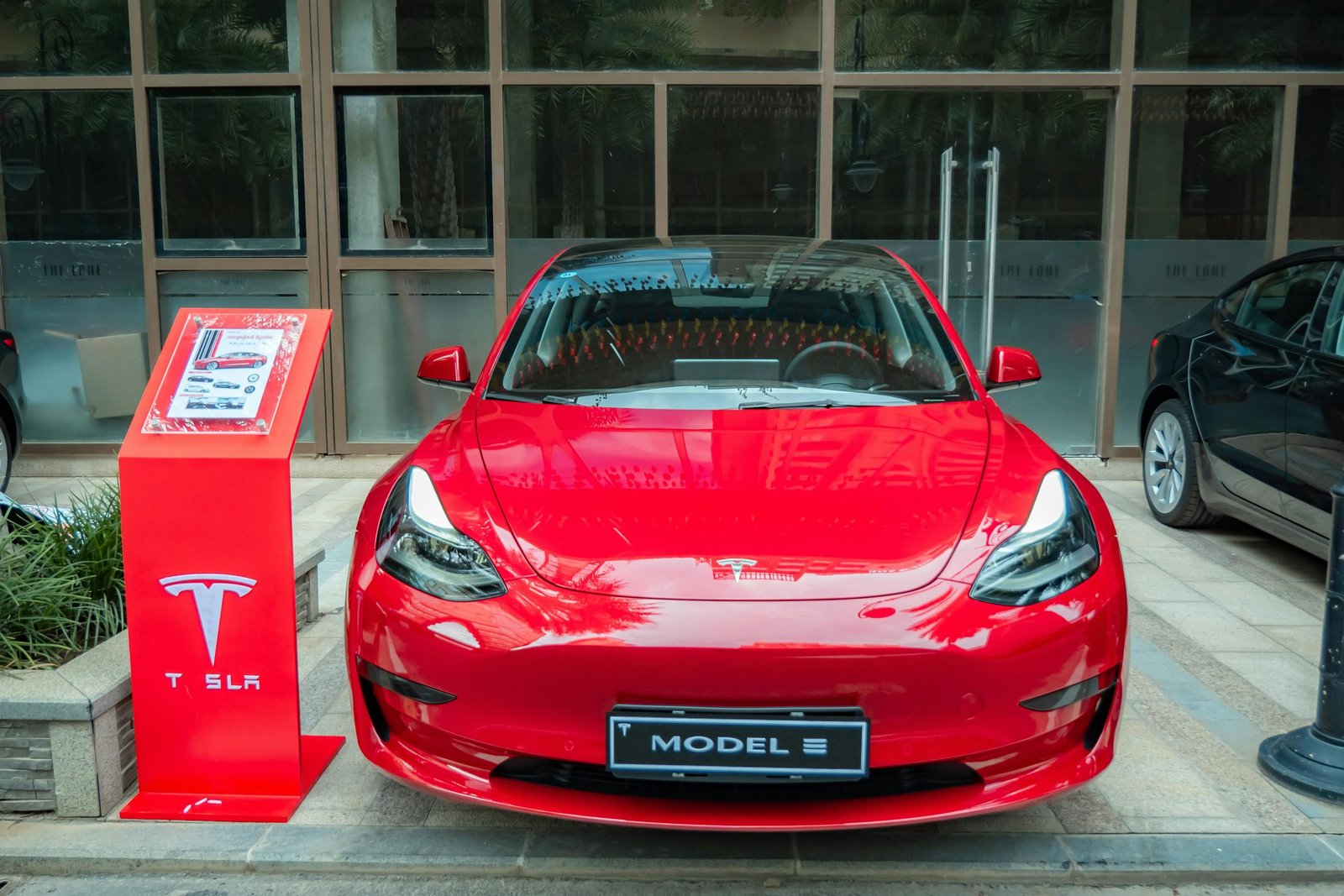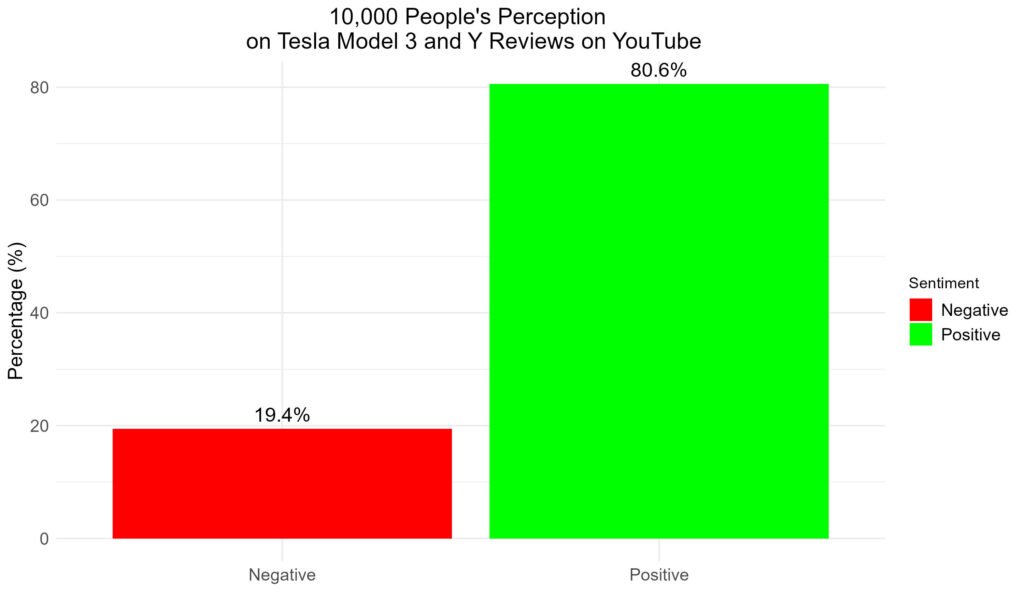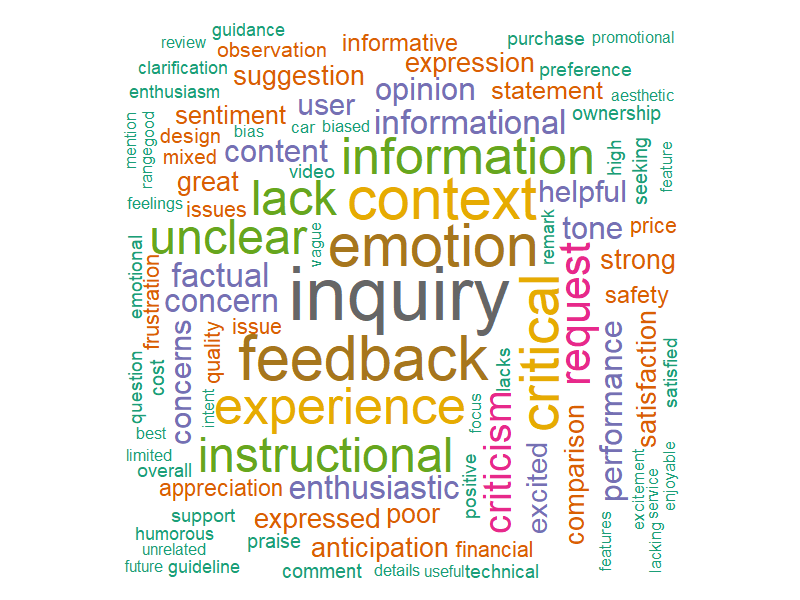Tesla Model 3/Y YouTube Reviews: 80% Viewers Show Strong Support

Unlock the secrets of Tesla Model 3 and Y reviews! Dive into my comprehensive analysis of 10,000 perspectives, revealing that 80% of current and future buyers love these EVs.
As electric vehicles (EVs) become more popular, it’s important to understand what people think about them. The Tesla Model 3 and Model Y are two of the top EVs that have gotten a lot of attention from consumers. To find out how potential buyers and current owners feel about these cars, I looked at comments from popular YouTube reviews. By counting the likes on these comments, I was able to capture the opinions of about 10,000 viewers.
How do customers view Tesla?
The videos I analyzed are some of the most popular, with one getting over a million views. Most focus on reviews, tips, and tricks for the Tesla Model 3 and Model Y.
I wanted to understand how viewers engage with this content and how they feel about these cars. Using the Google API, I gathered comments from YouTube and used a Large Language Model (LLM) from OpenAI API (GPT-4o-mini) to analyze the overall sentiment toward the Tesla Model 3 and Model Y. I used Python to automate data extraction and sentiment analysis, and R for data visualization.
It’s important to note that the first step of the analysis was to classify the sentiment into three categories: Positive, Neutral, and Negative. However, I observed that around 50% of the comments were Neutral, primarily focused on inquiries about the review, general statements about the car, or sharing information. Since these Neutral comments did not express any negative sentiment, I included them in the Positive category to better reflect their overall contribution to the discussion.
The analysis revealed that 80.6% of commenters had positive feelings, while 19.4% expressed negative views.

Comment Classification and Interpretation
To gain deeper insights into the nature of the comments, I employed the GPT-4o-mini model to classify them into various categories. The results reveal a complex landscape of sentiments among viewers, shedding light on both concerns and enthusiasm surrounding the Tesla Model 3 and Model Y. The plot below shows the key findings

Expression of Concern: A significant 58.4% negative comments fall under the category of “expression of concern.” Many users worry about specific aspects of the vehicles, such as reliability and performance. Addressing these concerns could be crucial for Tesla in improving future models and updates.
General Enthusiasm and Instructional Feedback: On the positive side, “general enthusiasm” represents 20.8% of positive comments, indicating a strong appreciation for the vehicles among owners and enthusiasts. Furthermore, “instructional feedback” accounts for 23.1% of positive sentiments, showing that viewers engage constructively, often sharing helpful suggestions and insights about their experiences.
Interest in Purchase: Interestingly, while 11.1% of positive comments express interest in purchasing a Tesla, only 0.21% negative comments are associated with this category. This discrepancy suggests that while many potential buyers are excited about owning a Tesla, there are also hesitations reflected in negative sentiments.
Dissatisfaction: The “dissatisfied ownership” category captures a smaller share at 10.4%, indicating that although some owners report negative experiences, the majority seem satisfied with their Tesla ownership. This points to a generally positive user experience overall.
Requests for Information: A notable aspect of the comments is the desire for more information, as indicated by the “request for information” category, which makes up 3.3% of positive sentiments. This shows that many viewers seek guidance on using various features in their Teslas, highlighting an opportunity for content creators to provide detailed tutorials and instructional content.
Lack of Information: Additionally, the “lack of information” category accounts for 21.8% of positive comments, suggesting that while viewers value the existing content, they still feel there are gaps that need to be addressed.
Overall, my analysis indicates a predominantly positive sentiment toward the Tesla Model 3 and Model Y, balanced by specific areas of concern that Tesla could address to enhance customer satisfaction and maintain its positive reputation. By focusing on viewer concerns and providing additional informational resources, Tesla can continue to build a strong community of informed and enthusiastic users.
Comment Summary and Word Cloud Insights
I utilized the LLM from OpenAI to summarised each comments into key phrases and conducted a text analysis using a word cloud. The results reveal an overwhelmingly positive sentiment among the comments, as illustrated below.

The word cloud prominently features positive sentiments, with terms like “experience,” “excited,” and “high” dominating the visual. This indicates that many commenters share their positive personal experiences with the vehicles and express genuine enthusiasm for them.
In addition, neutral terms such as “inquiry” and “context” suggest a significant focus on information gathering and understanding the vehicles within their broader context. This reflects viewers’ desire to learn more about the functionalities and features of the Model 3 and Model Y.
However, there are also negative terms present, including “issue,” “financial,” and “car.” These suggest that some commenters have encountered problems or expressed concerns, particularly related to financial aspects or issues with the vehicles themselves.
Overall, the word cloud illustrates a predominantly positive sentiment towards the Tesla Model 3 and Model Y, emphasizing personal experiences, excitement, and perceived high quality. Nonetheless, it also highlights areas of concern regarding issues and financial aspects related to the vehicles.
Techwheel’s Take
My analysis reveals that the Tesla Model 3 and Model Y are well-received, with the sentiments of about 10,000 people reflected in the YouTube comments analyzed. A substantial 80.6% express positive feelings about these vehicles, indicating strong enthusiasm among current and potential buyers.
However, it’s important to acknowledge that 19.4% of comments express negative sentiments, with some users voicing concerns about reliability and performance. This highlights areas where Tesla can improve to maintain its positive reputation. Interestingly, while 11.1% of positive comments express interest in purchasing a Tesla, many viewers come to these videos seeking more information about how to use various features. This underscores a clear demand for guidance, as 3.3% of positive sentiments are requests for additional information. Additionally, 20.8% of positive comments showcase viewers sharing their excitement and appreciation for the vehicles.
By addressing both the informational needs and concerns raised by users, Tesla can enhance customer satisfaction and strengthen its community of informed users. This understanding not only benefits Tesla but also helps potential buyers make well-informed decisions.







Leave a Reply